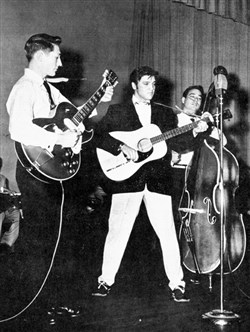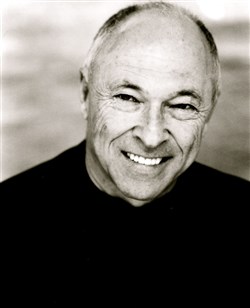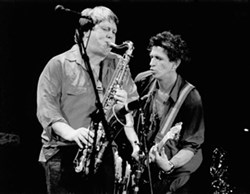VOL. 39 | NO. 24 | Friday, June 12, 2015
Stones’ Nashville connections go way back
By Tim Ghianni | Correspondent

In this 1957 file photo, Elvis Presley performs in the summer of 1957, with Scotty Moore on guitar, left, and Bill Black on the stand up bass, right.
-- Ap Photo/File While Brad Paisley lives what he calls “a bucket list item” by singing while playing his guitar in typically showy fashion as the opening act for The Rolling Stones, the most important guitarist in rock ‘n’ roll history and a man idolized by Keith Richards and Ronnie Wood will be sitting in his house on Blueberry Hill in the hills of northern Davidson County.
“Maybe one of the boys will come up here,” says Scotty Moore who invented the role of rock ‘n’ roll lead guitarist on July 5, 1954, when he and a weird kid named Elvis and standup bassist Bill Black – originally called simply “Elvis, Scotty and Bill” on show bills – cranked out “That’s All Right,” the old Arthur Crudup blues song, while wild-eyed Sam Phillips captured it all on tape.
It was the equivalent of the Big Bang. No, a world wasn’t birthed, but the four men in the studio were batch-brewing a combination of blues and hillbilly music that would be called “rock ‘n’ roll.”
“I just like these boys, really,” says Moore, a gentle soul who lost his ability to play guitar thanks to a near-mortal clash with a hematoma years ago. He has already seen his share of Stones concerts. He has hung out and drank hard with all of The Stones, but he has particularly strong friendships with both Stones guitarists mentioned above.
“All of them are real nice guys,” he says. “We always have a good time when we’re together.”
While there are plenty of Nashville connections to The Rolling Stones, perhaps none is stronger and truer than the bond Moore shares with the rock warhorses he refers to as “the boys.”
Another close friend (and former babysitter) of The Stones says he, like Moore, will be staying home in Lebanon rather than spending the evening at LP Field.
Bill Carter – former Secret Service agent, lawyer, music insider and television producer – has “seen The Stones 194 times, and I’ve never seen a bad show,” says the 79-year-old who long-ago devised a security plan that enabled the band to play in America, despite State Department worries that rioting would ensue.
“No one was ready for that big of a concert,” says Carter, whose book, Get Carter, describes that and other colorful portions of both his time with the Stones and his career in general.
“It’s kind of like another lifetime,” he says. “We’re all in our 70s. People ask me if I’m going to the show, but I’m not unless Keith calls me and asks me to come out. To go to the stadium is total chaos and it’s hard (at his age) to hang out for three hours, standing up in the stadium and watching.”

Carter
Another Richards crony, J.I.Allison – drummer for Buddy Holly & The Crickets (and just The Crickets after the day the music died, as Don McLean dubbed the icy Iowa plane crash that killed Holly, Ritchie Valens and The Big Bopper) – first thought he’d be spending the evening at his 350-acre his farm in Lyles where “we begins drinking beer at 4.”
But just the other day, Richards’ longtime assistant, Jane Rose, told Allison that he and wife Joanie have tickets. And excitement plays in his voice.
He notes that in his youth he and Holly wrote a little song called “Not Fade Away.” (He doesn’t share writer’s credit on the record due to the questionable label practices and politics of that era).
While more often than not, The Rolling Stones still open their shows with “Jumping Jack Flash,” they changed it up in their 1994-95 Voodoo Lounge tour (or at least they did in Aug. 6, 1994, when this writer and then-Nashville Banner cohort Jay Orr, now a Country Music Hall of Fame and Museum honcho, saw them in Birmingham, Ala.) That time after the bored audience chattered through then-massive-stars and opening act Counting Crows sing “Mr. Jones” and more (see what Paisley’s got to look forward to?), Charlie Watts began pounding out the tom-tom intro to “Not Fade Away” in the pitch black, as the lights slowly came up.
“I actually played that on a cardboard box when we recorded it in Clovis, N.M.,” says Allison, who until recent years has remained active in the music community.
He was stunned earlier this year when his legendary bassist pal Joe B. Mauldin died after a brief battle with cancer, leaving him with only guitarist Sonny Curtis (who actually joined the band after Holly died) to share the moniker “The Crickets.” The other original member of that band included guitarist Niki Sullivan, who died of a heart attack in 2004.
Just how close are and were The Crickets to The Stones?
Richards came to Nashville in 2008 to participate in the band’s induction into the Musicians Hall of Fame (now housed in Municipal Auditorium, home of two of The Stones’ noteworthy local appearances.)
“What you cats in America don’t realize is that this is probably the first global, international rock band of all time,” Richards told then-Tennessean music journalist Peter Cooper – who now works with Orr – in 2008, when The Crickets were inducted into the Musicians Hall of Fame. “These guys wrote them, sang them and recorded them, and it so impressed us in England. There would probably be no Beatles or Rolling Stones without them.”
While Elvis chose to stay in the United States for his musical career, Holly and his friends toured Europe, helping to capture the hearts and minds of those who would launch “The British Invasion.”
During the Musicians Hall of Fame induction, The Crickets performed “That’ll Be The Day,” their No. 1 hit from 1957 (also recorded in Clovis). Interestingly that was the first song recorded by a little Liverpool outfit called The Quarrymen, who changed their name to The Beatles, partly as homage to The Crickets.

Bobby Keys in 1982 with Keith Richards.
-- Photograph Courtesy Of Bobbykeys.Net And Jane RoseRichards may or may not sing when the band hits LP Field – he has voiced Stones hits like “Happy” and led his own band, The Xpensive Winos, during one of the periods he and childhood chum Jagger were estranged.
Allison stays in close contact with Richards, and in fact, The Rolling Stone and his wife and guitar tech took a sidetrack on their way home from the Bahamas a few years ago, coming to the Allisons’ house in Lyles. “They came and spent a few days on the farm,” says Allison. “We had a great time.”
Allison laughs while recollecting the induction celebration. “We tried to get Keith to sing some, but he just wanted to play.”
And boy does Richards want to play, according to Carter, the man who spent years making sure The Stones weren’t unduly bothered by American law enforcement and even participated by handling a little “misunderstanding” Richards and Wood endured in Fordyce, Arkansas, and also helping Richards through the woes after the Mounties busted him on heroin charges in Toronto in 1977.
The band-threatening bust ended with a suspended sentence, probation and two concerts by The Stones that benefited the Canadian National Institute for the Blind.
“I don’t think there’s anything like the electrifying music of The Stones,” explains Carter. “When Keith comes out on the stage and begins that first song, usually ‘Jumping Jack Flash,’ and he throws that scarf over his shoulder and he’s usually smoking a cigarette (and) 100,000 people will come to their feet.”
Richards had a little fun at Carter’s induction into his home state Arkansas Hall of Fame in 2013. “They were doing these video testimonials,” he recalls. Carter’s famous and infamous friends participated, but he was shocked when he saw that the production crew even had gotten to Richards.
“When he comes on the screen, he is sitting in a chair smoking a cigarette. He said ‘Bill, congratulations on being indicted…. I mean Inducted.”
It should be noted that it wouldn’t be surprising if The Stones throw out a salute to one of their best friends and a member of The Stones entourage, Bobby Keys. The great sax man, whose work with the iconic rockers includes, for example, the sax part on “Brown Sugar,” actually began his touring days with fellow Texan Holly and became Allison’s friend 55 years ago.
Later came Keys’ long affiliation with The Stones, not just in concert but on many of their classic albums. A good-natured soul who could often be found at Brown’s Diner on Nashville afternoons, Keys died last December of a liver ailment while his family surrounded him at their Franklin home.
If he had lived, of course he’d be up on the stage, wailing away perhaps on “Happy” or “Sweet Virginia,” another Stones song that scrapes along with a decidedly country flair.
“Keith has said Bobby was his best friend,” says Allison, crediting Keys for his friendship with Richards. “Bobby was a great sax player and will be missed.”
And then it’s back to Moore, who is 83, on Blueberry Hill, where he will wait and see if a BBC crew and Wood have time to come out and do a little feature on a collection of Elvis’ old 78s he treasures.
His kinship with The Stones dates back to 1988 when Wood called to invite him to the closest arena the band was playing on that tour: St. Louis. By then The Stones had outgrown modest venues like Municipal Auditorium.
Gail Pollock, Moore’s companion of almost 40 years, remembers well the phone call invitation from Wood, who may be the narrator of the BBC taping, since his old friend sometimes has minor difficulty speaking.
Wood made the St. Louis invite by calling the Music Row office where Pollock and Moore were working. When Pollock told Moore ‘there’s a Rolling Stone on the telephone,’ he said ‘who?’
“For some unknown reason which amazed me, he agreed to go,” recalls Pollock, as Moore chirps in details during a phone conversation with this old journalist friend. “So I came home and started through all of my records on The Rolling Stones because he didn’t know who in the hell they were.
“All the years he was working and making a living, he didn’t listen to current pop.”
Then came the trip to St. Louis. The Stones flew him in and put him up in the same hotel where they stayed. “After the show they enlisted Scotty into the room (where one of The Stones, likely Richards, was staying).
“It was him and Ron and Keith,” says Pollock. “They were getting skunky-drunky and decided they wanted Scotty to teach them the licks to ‘Mystery Train.’
The alcoholically impaired trio didn’t get very far when trying to handle their guitars. “They stayed up most of the night. I don’t think they ever got to learn to play the lick to ‘Mystery Train.’”
Richards, who famously said “Everyone else wanted to be Elvis, I wanted to be Scotty,” when recalling first hearing the Memphis boys on pirate radio in London, also has participated in a recording session with Moore and early Elvis drummer (and Nashvilian) D.J. Fontana at the late Levon Helm’s Woodstock studio.
The sessions, which produced the star-studded All The King’s Men tribute to Elvis on the 20th anniversary of his death, included Richards swapping guitar licks with Moore and joining Helm and The Band to sing “Deuce and a Quarter,’ written by Nashville’s Gwil Owen and Kevin Gordon.
Pollock testifies to the many alcohol-fueled meet-ups of the too-tight trio -- Woody, Richards and Moore -- back in the days before health issues slowed Moore down.
“When Scotty had his heart attack, Keith sent Scotty a fax from Jamaica, saying ‘Scotty, you are scaring me to death, you are my bad example.’”
The next time the two met up, Moore asked Richards about that. “Keith says: Some people are always telling me ‘you’re going to drink yourself to death.’ I say ‘No, I’m not, look at Scotty.’
Some point after that Richards fell out of a tree (a palm he was climbing in Fiji) and suffered a subdural hematoma like Scotty had. Scotty sent him a fax saying ‘Musicians sit on the beach and watch the monkeys. The monkeys climb the tree.’”
While Moore laughs in the background, Pollock adds: “Scotty has been in contact with the guys now for 27 years, and he always has enjoyed their company every time he’s seen them. He’s always been given utmost respect from these guys. They tease and laugh at each other and they enjoy being together.”
That friendship also extends to the “more-reserved” Mick Jagger and the professorial Charlie Watts.
Unless something changes, Moore and Carter will be in their homes as The Stones parade five-plus decades of hits undercover of the LP Field night.
“It’s really for young people,” Carter explains of the concert that features a quartet of fellows either pushing or traveling through their 70s.
Of course, Allison, is eager to put off his 4 p.m. beer-drinking on the Lyles farm to come to Music City and see his old pal and the rest of the boys he and Buddy inspired.
“They are definitely one of a kind,” says Allison, 75, who marvels at the real Jumping Jack Flash’s gas, gas, gas. “Mick Jagger runs around more in one day than I do in a month.”